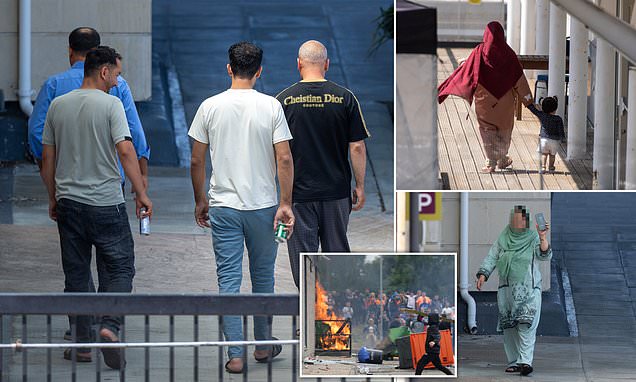When we think of asylum seekers in the UK, the common picture painted is one of extreme poverty—surviving on just a few pounds a week while waiting for the Home Office to process their claims.
It’s often said they cannot work or claim benefits like British citizens and that life is a daily struggle.
But the reality is more nuanced. While asylum seekers do face restrictions on standard benefits, they have access to a wide range of government-funded support and charitable services, all partly paid for by taxpayers.
From housing to healthcare and even leisure activities, the support system for asylum seekers is surprisingly comprehensive.
Housing and Hotel Stays
Many asylum seekers are provided with accommodation directly by the state, including hotel rooms.
Although the proportion is slowly decreasing, last year more than a third of asylum seekers—37 percent—were housed in hotels, with the figure rising above 60 percent in London, the South-East, and the East of England.
The Bell in Epping, Essex, is one of the better-known hotels used for this purpose and has been the focus of recent protests following allegations of a sexual assault.
Three-star hotels like this often include amenities such as Wi-Fi, bars, restaurants, and gardens.
The Home Office spent around £2.1 billion on hotel accommodation in the year to March.
Food and Basic Essentials
Asylum seekers receive a weekly allowance of £49.18 for food and essentials, reduced to £9.95 if meals are provided in their accommodation.
Beyond that, many can access food banks—some specifically for asylum seekers—like Asylum Welcome in Oxfordshire, which provides fresh produce and toiletries five days a week, partly funded by local councils.
In Cambridge, city council grants have enabled free cooking lessons and other resettlement projects, totaling £250,000 since 2022.
Healthcare Benefits
While most residents pay for prescriptions, dental care, or glasses, asylum seekers are often issued HC2 certificates, exempting them from many charges.
In the last five years, nearly two-thirds of HC2 certificates went to asylum seekers.
Additional support includes free wigs for those undergoing cancer treatment or suffering hair loss due to conditions like alopecia, with costs ranging from £80 to over £300.
Mobile dental units have even visited asylum hotels, highlighting disparities with locals struggling to access NHS dental care.
Education Opportunities
While British students accumulate debt, around 80 universities offer bursaries, scholarships, or fee waivers for asylum seekers.
Examples include free studies under the Rowan Williams scholarship at Cambridge and fully covered masters courses at Oxford colleges.
Aston University offers fee waivers and up to £25,000 for living costs.
Other universities supporting asylum seekers include Bath, Bristol, Edinburgh, Essex, Durham, Glasgow, Leeds, Leicester, Manchester, Nottingham, and Imperial College London.
Local councils, like Richmond, also provide discounted language lessons.
Transport Assistance
Asylum seekers can receive free or discounted travel in various cities.
Newcastle offers free bus and Metro travel, Oxford piloted free bus passes, and Scotland plans to provide free bus travel next year.
HC2 certificates also cover travel to medical appointments using the cheapest suitable method.
Several councils provide free driving lessons or test fees, including Staffordshire, Kent, Bracknell Forest, and others.
Leisure and Entertainment
Leisure opportunities are also widely available.
Bristol City Council funds trips to football and cricket matches, Croydon offers DJ courses, West Sussex has provided gaming consoles and yoga classes, and Richmond hands out ‘Richmond Cards’ for free swimming, gym, and group exercise sessions.
Other councils offer discounts on massages, cinema tickets, dinghy hire, golf, martial arts, trampolining, and theatre shows.
Some local residents must pay for these programs, whereas asylum seekers receive them free or heavily subsidized.
Clothing and Consumer Goods
The Home Office reportedly spends £3,600 daily on clothing packs for new arrivals, including basic clothing and footwear, with winter items added as needed.
Some asylum seekers also receive mobile phones, funded by local partnerships, and councils have previously paid for TVs, cinema trips, and shopping sprees.
Even failed asylum seekers in immigration removal centres are provided mobile phones to maintain contact.
Legal Aid Support
Accessing legal services can be expensive for the average UK resident, but asylum seekers can receive substantial support for legal challenges to Home Office decisions.
Since 2018, taxpayers have funded £135 million in legal aid for asylum cases, including multiple appeals for individuals whose cases had already been rejected, highlighting the scale of government involvement in supporting legal claims.

